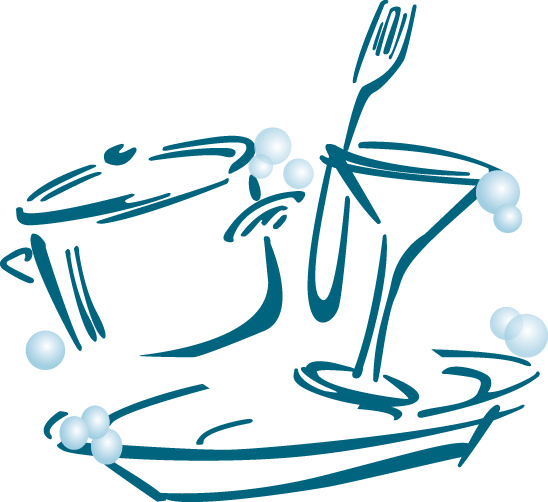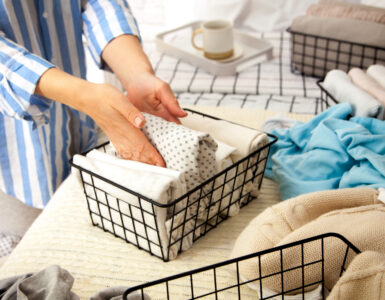Family and Consumer Science Educator Teresa Hunsaker shows us that it is possible to use common kitchen baking ingredients to make effective household cleaning solutions.
The following products not only work, they save money. As an added bonus these products are also more environmentally friendly than their commercial alternatives!
Cream of Tartar – derived from plants (grapes, bananas, tamarinds) as tartaric acid. It is mildly acidic powder that has a number of great uses in cleaning.
Burned on Food:
Fill the burned pot or pan with enough water to cover the burned area with at least a half an inch of water. Pour about 1 to 2 TBS cream of tarter over the water. Place pan on stove and heat to a low simmer. Let simmer for 5 or 6 minutes. Cool. Scrub with tuffy scrubber. Voila! (Also works well on burner dripper pans on the stove—make a paste of equal parts cream of tarter and vinegar, rub on, let sit 10-15 minutes, scrub off burned on build up.
Rust in Laundry:
Make a paste of cream of tartar to clean rust from washable fabrics. To make the paste, mix a small amount of water with some cream of tartar until the consistency is appropriate. Apply this to rust stains and gently rub it into the stain. Let the mixture set for about 10 minutes and wash as usual.
Stains in Your Tub:
Let this simple solution of cream of tartar and hydrogen peroxide do the hard work of removing a bathtub stain for you. Fill a small, shallow cup or dish with cream of tartar and add hydrogen peroxide drop by drop until you have a thick paste. Apply to the stain and let it dry. When you remove the dried paste, you’ll find that the stain is gone too.
Problem with Ants:
Repel ants by sprinkling cream of tartar around the hole the ants come from, and they won’t come out. Sprinkle it on cracks and crevices and near your doorway to repel ants from the outside and keep them from coming in.
Ring Around the Collar:
Wet the collar area and rub in some cream of tartar. Launder as usual and the collar will be clean.
Vinegar – Mildly acidic white vinegar dissolves dirt, soap scum, and hard water deposits from smooth surfaces, yet is gentle enough to use in solution to clean hardwood flooring.
White vinegar is a natural deodorizer, absorbing odors instead of covering them up. Any vinegar aroma disappears when dry. With no coloring agents, white vinegar won’t stain grout on tiled surfaces. Its acidity cuts detergent residue, and makes a great fabric softener substitute for families with sensitive skin.
Pet Accidents on Carpet:
4 TBS Vinegar
2 Cups Hydrogen Peroxide
2 TBS Liquid Dishsoap
1 TBS Lemon Juice
2 TBS Baking Soda
Mix in 1 QT bottle. Add water to complete the quart—about 2 cups. Spray on spot to neutralize (for odor control) and clean. Follow up with plain water. Towel dry.
Film on Glasses from Dishwasher:
Hard water + very alkaline dishwasher detergent + hot water (too hot most of the time) = milky film on glassware. Mix two parts water with one part white vinegar in a large sauce pan. Add 3 or 4 glasses to be cleaned. Bring to a low simmer for 15-20 minutes. With rubber tongs remove glasses to sink with hot sudsy water and mild scrubber. Finish cleaning off any film by scrubbing lightly and then polishing dry. Your glasses will sparkle.
Clean and deodorize a drain:
Pour 1 cup baking soda into drain, then one cup hot white distilled vinegar. Let this sit for 5 minutes or so then run hot water down the drain.
Floor Cleaner:
Mix a solution of 3 drops dishwashing liquid to 1/3 part white distilled vinegar, 1/3 part rubbing alcohol, and 1/3 part water. Spray sparingly and mop for a fast clean-up.
Baking Soda – Baking soda (bicarbonate of soda) is a naturally occurring material, present in most organic life forms. It can be “made” from sodium carbonate, or soda ash. The soda ash is dissolved in a carbon dioxide rich solution, and sodium bicarbonate (baking soda) precipitates out. Baking soda’s mild abrasive action and natural deodorizing properties make it a powerful replacement for harsh commercial scouring powders.
Candle Wax out of Fabric:
Remove as much of the wax as possible by scrapping. (Some people like to place the article in the freezer to make the wax brittle in order to chip it off). After carefully scrapping as much of the wax out as possible, take at least a double layer of very absorbent paper towels and a warm iron and melt the remaining wax out of the fibers. You may need to repeat this process onto clean areas of the paper towel. (Some like to use a blow dryer rather than an iron.) Once the wax is removed it is time to treat the residue and stain. Place a few drops of liquid hand dishwashing detergent, some water, and some baking soda on the stain. Rub gently. Then place the article in a regular load of wash and add 1 cup of baking soda to the wash.
Carpet Spot Remover:
4 cups warm water
1/2 cup vinegar
2-3 Tablespoons baking soda
Add the vinegar and baking soda to the warm water in a large bowl. Stir slightly and allow it to fizz and foam. Dip a scrub brush into the mixture and scrub those spots in your carpet away. Let dry and then vacuum.
Crayon Off Walls:
A damp rag dipped in baking soda will remove crayon marks with little effort. Some folks like to soften/melt the crayon by using a hair blow dryer. Others like to add a bit of baby oil to the soda for the really tough crayon stains.
Refrigerator Interior Cleaner or Microwave:
2 tablespoons baking soda
1 quart warm water
Scrub stubborn spots with baking soda on a sponge. Use this mixture to wash exterior of refrigerator and other appliances, also.
To Clean Silver:
Put foil in the bottom of a bowl or dish. Add 2 Tbs. baking soda and 1 teaspoon salt. Put your jewelry/silver on top of the mixture. Add boiling water to cover, wait about 2 minutes. You will be amazed at the results! The foil and baking soda create a chemical reaction that removes tarnish! Or, 3 heaping Tbs. baking soda, piece of aluminum foil, crumpled up, added to a pan with boiling water and leave a few minutes. For objects that cannot submerged in the solution, use a paste of 3 parts baking soda to one part water. Rub the paste onto each item, then rinse with warm water and dry with a soft cloth.
For more information about this or any consumer issue, call USU Extension Weber County at (801) 399-8200 or online at www.extension.usu.edu/weber.















kiemelt letöltés instagram ép
instagram post downloader de alta qualidade
iphone kvaliteta instagram igtv preuzimanje
download instagram video
insta image download site
fraser wilson
tragus piercing youtube